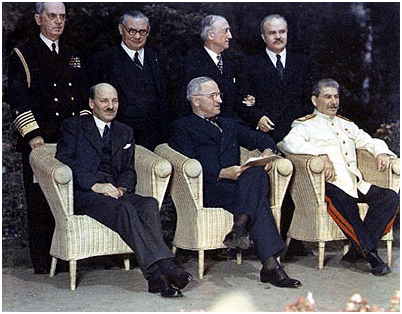3 August 1945 President Truman warns the Japanese of the consequences for rejecting the terms of surrender. |
On July 26, word arrived at Potsdam (Germany) that Winston Churchill had been defeated in his bid for reelection as British Prime Minister. Within hours, President Truman, Joseph Stalin-Russia, and Clement Attlee (the new British prime minister) issued their warning to Japan: surrender or suffer "prompt and utter destruction."
 Seated left to right; Clement Atlee, President Truman, Joseph Stalin Seated left to right; Clement Atlee, President Truman, Joseph Stalin |
As had been the case with Stalin, no specific mention of the atomic bomb was made to the Japanese. This "Potsdam Declaration" left the emperor's status unclear by making no reference to the royal house in the section that promised the Japanese that they could design their new government as long as it was peaceful and more democratic. Anti-war sentiment was growing among Japanese civilian leaders, but no peace could be made without the consent of the military leaders. They still retained hope for a negotiated peace where they would be able to keep at least some of their conquests or at least avoid American occupation of the homeland. |
On July 29, 1945, the Japanese rejected the Potsdam Declaration. President Truman gave authorization to the U.S. military to use the bomb, conditions permitting, anytime after 3 August.